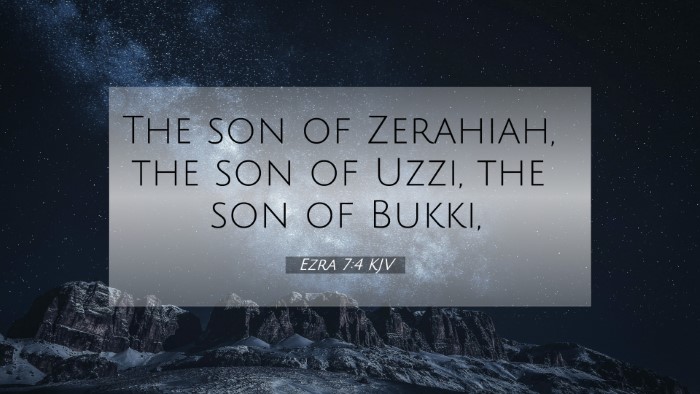Old Testament
Genesis Exodus Leviticus Numbers Deuteronomy Joshua Judges Ruth 1 Samuel 2 Samuel 1 Kings 2 Kings 1 Chronicles 2 Chronicles Ezra Nehemiah Esther Job Psalms Proverbs Ecclesiastes Song of Solomon Isaiah Jeremiah Lamentations Ezekiel Daniel Hosea Joel Amos Obadiah Jonah Micah Nahum Habakkuk Zephaniah Haggai Zechariah MalachiEzra 7:4 Similar Verses
Ezra 7:4 Cross References
The son of Zerahiah, the son of Uzzi, the son of Bukki,
Uncover the Rich Themes and Topics of This Bible Verse
Listed below are the Bible themes associated with Ezra 7:4. We invite you to explore each theme to gain deeper insights into the Scriptures.
Ezra 7:4 Cross Reference Verses
No cross reference images were found in our system for this Bible passage.
Ezra 7:4 Verse Analysis and Similar Verses
Understanding Ezra 7:4
This section provides a comprehensive analysis of Ezra 7:4, combining insights from various public domain commentaries, including those of Matthew Henry, Albert Barnes, and Adam Clarke. This approach will illuminate the meaning of this verse, along with its connections to other Bible verses.
Bible Verse: Ezra 7:4
Text: "The son of Ahitub, the son of Amariah, the son of Ahitub, the son of Phinehas, the son of Eli, the son of Aaron the chief priest."
Exegesis of Ezra 7:4
Ezra 7:4 details the lineage of Ezra, establishing his credentials as a significant priestly figure. By tracing his genealogy back to Aaron, the original chief priest of Israel, the verse asserts Ezra's rightful place in the priesthood and his authority in spiritual matters among the Jewish people.
Commentary Insights:
- Matthew Henry's Commentary: Henry emphasizes the importance of Ezra's heritage as a proof of his authority. It illustrates God's continued faithfulness to His covenant through a godly lineage, serving as an assurance to the Israelites of backed leadership in the post-exilic period.
- Albert Barnes' Notes: Barnes notes that the clearly furbished ancestral line reflects upon Ezra's knowledge and adherence to the laws, critical for his historical role in the restoration of the Jewish faith and community after the Babylonian exile.
- Adam Clarke's Commentary: Clarke highlights the priestly privileges associated with Ezra’s lineage, considering that being a descendant of Aaron not only granted him authority in religious matters but also emphasized the necessity of pure lineage in governance and the priesthood.
Connections to Other Bible Verses
Ezra 7:4 is rich in its inter-Biblical connections. Below are relevant cross-references that illuminate its significance:
- Exodus 28:1: God called Aaron and his sons to serve as priests, emphasizing the enduring nature of priestly roles.
- 1 Chronicles 6:4-15: Detailed genealogies illustrate the importance of lineage among the Levites, supporting Ezra’s claim to priesthood.
- Hebrews 5:4: Highlights the divine appointment of priests, drawing parallels to the call on Ezra’s life through his lineage.
- Malachi 2:7: Discusses the responsibilities of a priest and how the law should be with his mouth, connecting to Ezra’s role as a teacher of the law.
- Nehemiah 8:1-3: Coordinates with Ezra as a priest and scribe, showing the significance of public reading of the law.
- Leviticus 10:1-3: Discusses the holiness required of priests, reflecting on the character expected of descendants of Aaron.
- Titus 1:5: Paul draws on the importance of establishing elders in every town, much like Ezra was set to restore order in Jerusalem.
- Matthew 1:1-16: The genealogy of Jesus connects Aaron’s priestly lineage to the Messiah, suggesting continuity in God’s redemptive plan.
Thematic Bible Verse Connections
Ezra 7:4 connects to various themes in the Bible, such as:
- Leadership: Ezra’s role signifies the need for spiritual leadership rooted in righteous ancestry.
- Restoration: The focus on Ezra’s heritage attests to God’s plan for restoring worship in Jerusalem following exile.
- Covenantal Faithfulness: The lineage narrative affirms God’s commitment to His covenant with the Israelites through their enduring priesthood.
Tools and Methods of Cross-Referencing
When studying scriptures, utilizing tools for Bible cross-referencing can enhance understanding:
- Using a Bible concordance helps identify thematic connections quickly.
- Bible cross-reference guides can provide immediate verses relating to the original text.
- Employing Bible reference resources to cross-examine different books can reveal deeper themes.
- Explore bible chain references for a structured flow of connected verses on a topic.
- Utilize cross-referencing Bible study methods to analyze how Old and New Testament verses support each other.
Application of Ezra 7:4
This verse serves as a reminder of the importance of a strong spiritual background when leading others. In a modern context, it encourages individuals to seek understanding and grounding in a rich heritage of faith while fostering connections that affirm their spiritual journey.
Conclusion
Ezra 7:4 provides a fascinating insight into biblical lineage and the significance of heritage in spiritual leadership. Through cross-referencing this verse with others, one gains a fuller appreciation for the continuity and depth of God’s work through generations, demonstrating how God preserves and provides for His people.


